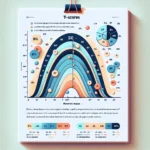# T-Scores in Cognitive Testing
**T-Scores Defined:**
T-scores are a standardized type of score used in cognitive testing and psychological assessments to compare an individual’s test performance to a normative group. These scores are particularly valuable for identifying levels of cognitive functioning, including memory, attention, reasoning, and other mental abilities.
**Understanding the Scale:**
T-scores have a mean (average) value of 50 and a standard deviation of 10. This means that a score of 50 represents average performance compared to the norming population, while scores above or below 50 indicate performance levels that are respectively higher or lower than average. A T-score of 60, for example, suggests cognitive abilities above the average, whereas a T-score of 40 would indicate below-average abilities.
**Application in Cognitive Assessment:**
In clinical settings, professionals use T-scores to help diagnose cognitive impairments, track changes in cognitive function over time, and evaluate the effectiveness of therapeutic interventions. By providing a quantitative measure, T-scores enable clinicians to make more precise and informed decisions.
**Comparisons Across Tests and Populations:**
Since T-scores maintain a consistent mean and standard deviation, they allow for direct comparisons across different cognitive tests and demographic populations. This aids in creating a comprehensive overview of an individual’s cognitive strengths and weaknesses.
**Interpreting Scores:**
Typically, T-scores between 40 and 60 are considered within the average range. Scores that deviate significantly from the mean indicate outlier performance. Clinicians interpret these scores within the context of the individual’s unique circumstances, including health status, educational background, and demographic factors.
**Role in Research and Education:**
Besides clinical applications, T-scores are utilized in cognitive research to analyze data and report findings. In educational settings, these scores assist in tracking student development and identifying those who may benefit from additional support services.
**T-Scores vs. Other Standard Scores:**
While T-scores are an invaluable tool, they are one of several standard scores used in cognitive testing, such as Z-scores, percentiles, and stanines. Each scoring system is tailored to specific applications and provides unique insights, making it crucial for practitioners to select the most appropriate scoring method for their assessment needs.
**Conclusion:**
Understanding T-scores is essential for interpreting cognitive test results. The standardization of T-scores makes them a widely accepted and reliable method for assessing cognitive abilities, playing a vital role in psychology, medicine, and education.
**Keywords:**
– T-scores
– Cognitive testing
– Psychological assessments
– Normative group
– Cognitive functioning
– Standard deviation
– Clinical settings
– Cognitive impairments
– Test performance
– Cognitive research
– Standard scores

